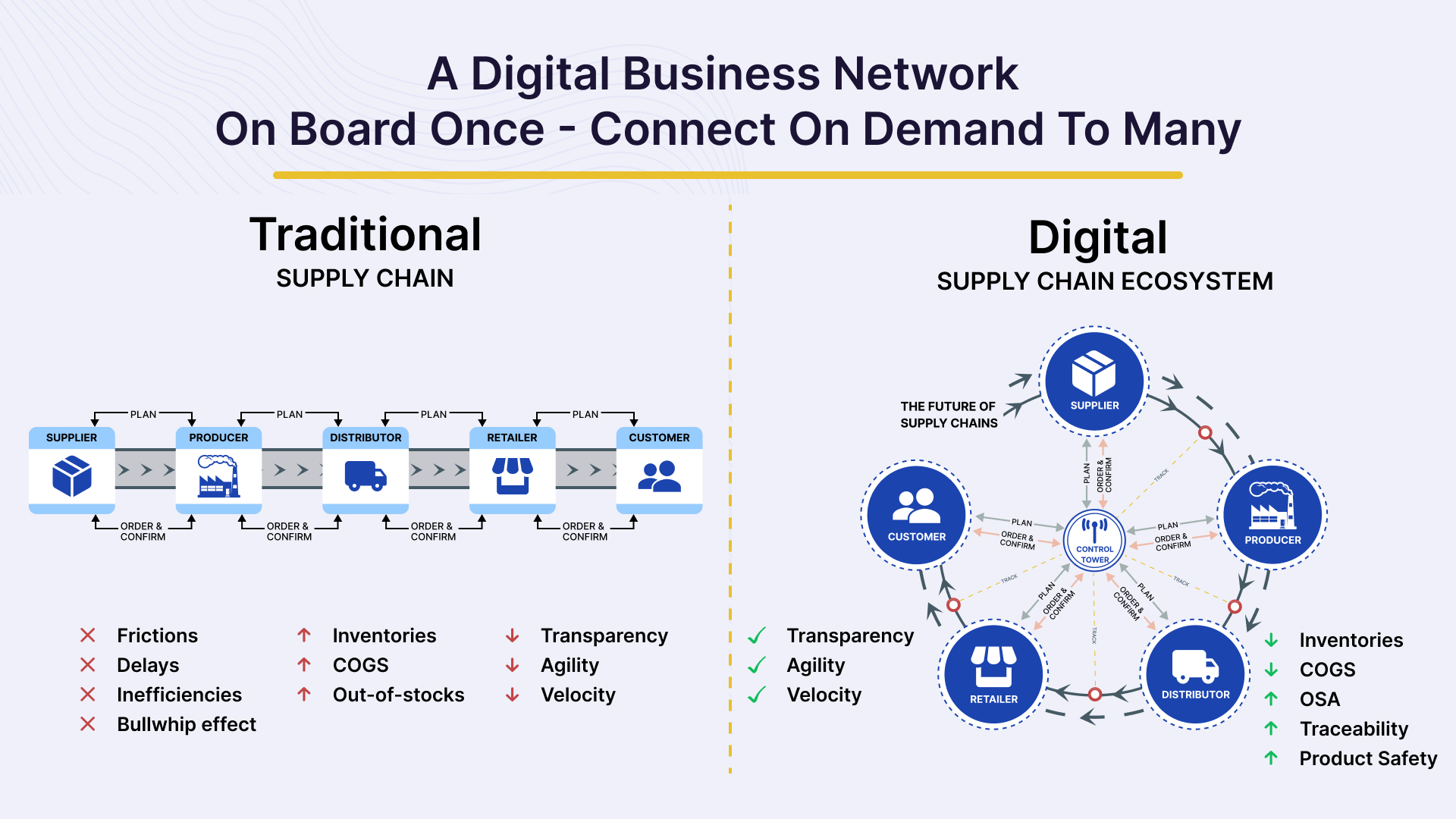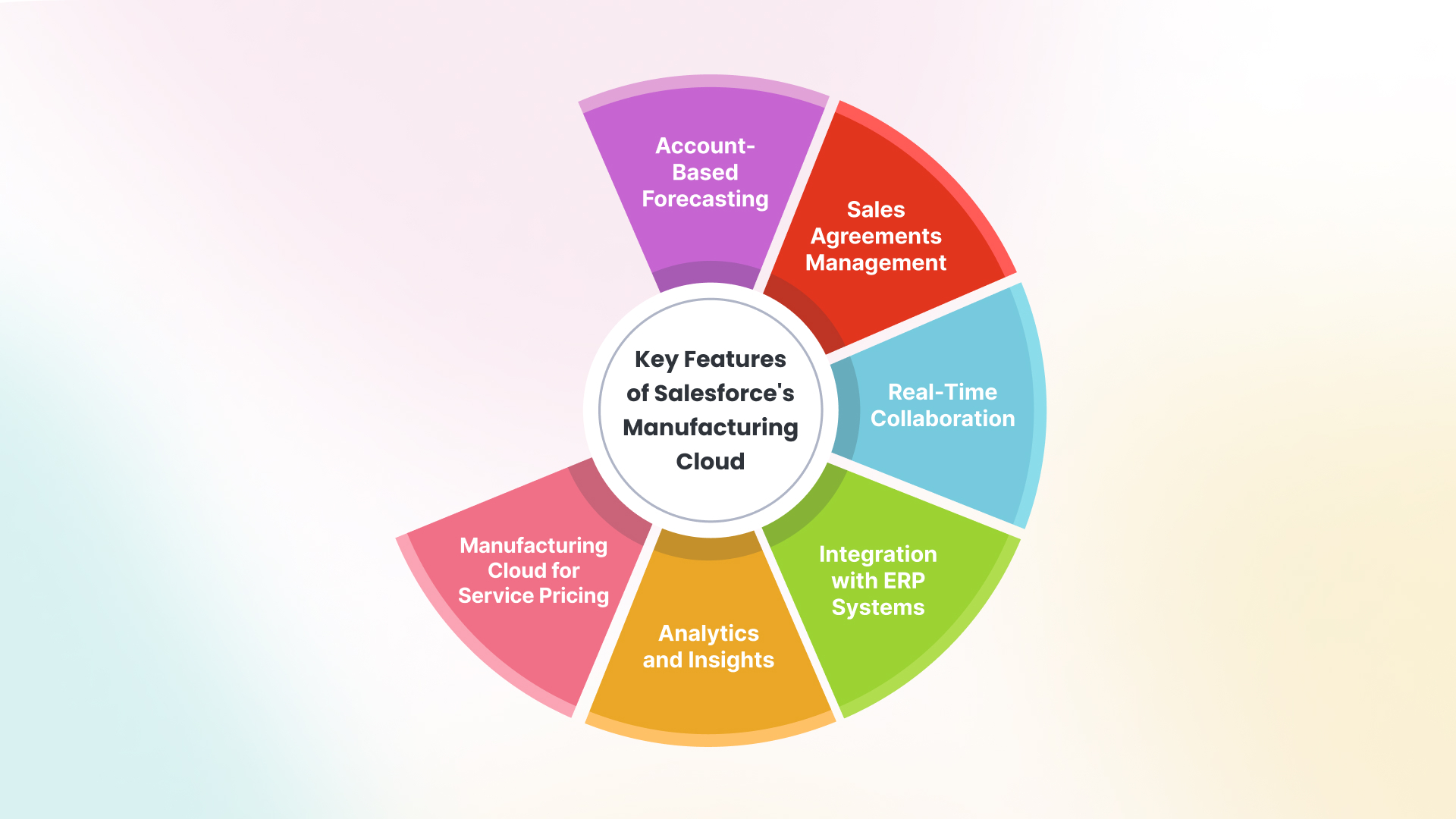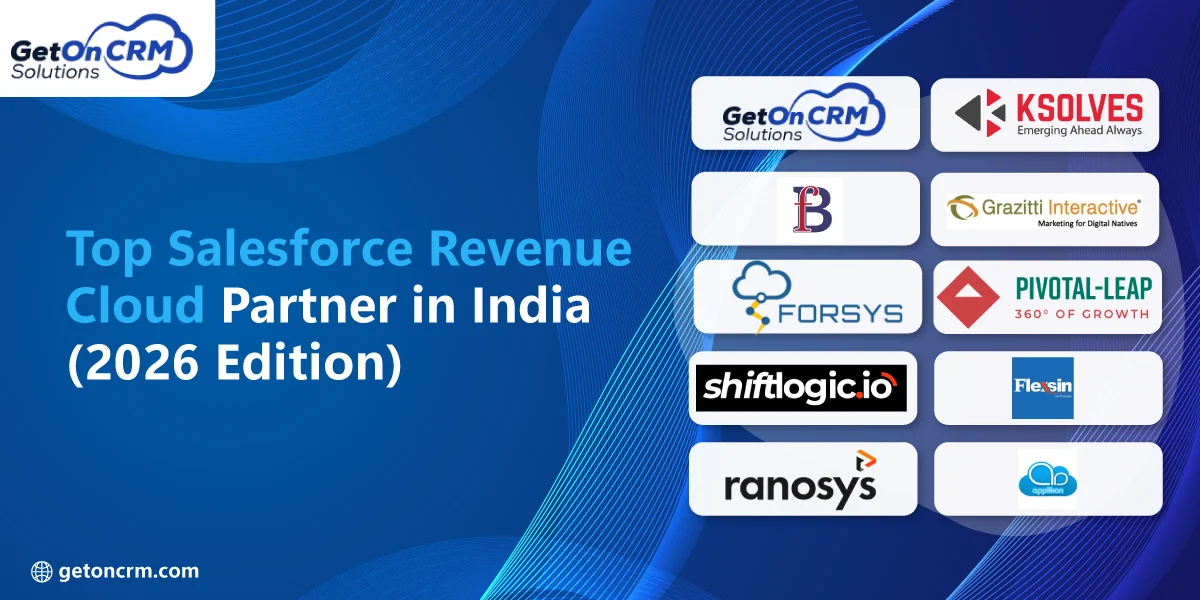The manufacturing sector has always been the backbone of economic growth, but modern supply chain challenges have put unprecedented pressure on the industry. Supply chain management in the manufacturing sector has always been a complex task, involving intricate workflows, unpredictable market demands, and a network of diverse stakeholders.
Despite advancements, many manufacturers struggle with outdated systems, lack of real-time data, and inefficient processes, hindering their ability to meet the market’s evolving expectations.
In response to these challenges, technology has emerged as a driving force for change. Among the numerous solutions available, Salesforce stands out as a transformative tool that redefines how manufacturing supply chains operate. With its unified platform and advanced features, Salesforce empowers manufacturers to overcome supply chain complexities, streamline operations, and achieve business growth.
Understanding Modern Supply Chain Challenges in Manufacturing
Manufacturing supply chains are the backbone of production industries, ensuring raw materials are transformed into finished goods efficiently and delivered to consumers. However, the increasingly complex and interconnected global landscape presents significant challenges.
Below is a deeper dive into the critical pain points faced by modern manufacturing supply chains, along with why traditional solutions are often insufficient.
Key Pain Points in Manufacturing Supply Chains
1. Lack of Real-Time Visibility
One of the most pressing challenges is the inability to monitor supply chain operations in real time. Many manufacturers rely on fragmented or siloed systems, where different departments or partners use disparate platforms. This lack of integration creates blind spots, such as:
- Delayed Inventory Updates: Inability to track stock levels across warehouses leads to inefficiencies in replenishment cycles.
- Unforeseen Disruptions: Events like shipment delays or production halts are detected too late, leading to cascading problems in meeting delivery timelines.
- Lost Opportunities: Without a comprehensive view, businesses miss opportunities to optimize routes, improve vendor management, or enhance customer service.
2. Inefficient Demand Forecasting
Accurate forecasting is crucial for balancing supply with demand. However, many manufacturers struggle with outdated models that fail to consider dynamic factors such as:
- Seasonal trends and market shifts.
- Customer preferences and purchasing behaviors.
- Geopolitical events disrupting global supply chains.
This results in overproduction (causing increased storage costs and waste) or underproduction (leading to missed sales and customer dissatisfaction).
3. Communication Gaps
Supply chains involve multiple stakeholders, including suppliers, manufacturers, distributors, and customers. Misalignment and miscommunication among these parties can lead to:
- Inefficiencies: For example, delays in passing order changes down the supply chain result in errors or missed deadlines.
- Increased Costs: Miscommunication about order specifications or inventory levels leads to unnecessary production adjustments or logistics expenses.
- Dissatisfaction: Poor collaboration between teams translates to delays, product defects, or inadequate support for end customers.
4. Reliance on Legacy Systems
Legacy systems often form the backbone of many manufacturing operations, but they lack the agility and functionality to meet today’s demands. These systems struggle to:
- Handle Data Complexity: Legacy tools cannot process or analyze the vast volumes of data generated in modern supply chains.
- Integrate with Modern Solutions: They are often incompatible with emerging technologies like IoT, blockchain, or AI.
- Adapt to Change: As markets evolve, rigid, manual systems fail to scale or adjust workflows efficiently.
Why Traditional Solutions Are Falling Short
Traditional supply chain tools were designed for a simpler, more static era, and their limitations are increasingly evident in today’s dynamic environment.
1. Limited Integration Capabilities
Older systems operate in isolation, creating data silos that hinder collaboration and decision-making. For instance:
- A transportation management system may not sync with a warehouse management platform, leading to inefficiencies in inventory tracking and order fulfillment.
- The lack of centralized data systems means managers spend significant time reconciling information from disparate sources.
2. Scalability Issues
Traditional tools are often tailored to fixed operational scales. When businesses grow or expand globally, these systems:
- Struggle to accommodate new geographies, suppliers, or distribution networks.
- Require costly, time-consuming upgrades or replacements to handle increased complexity.
3. Inability to Support Advanced Analytics
Advanced analytics are vital for gaining predictive insights and optimizing processes, but legacy systems:
- Lack the computational power to process complex datasets.
- Cannot leverage machine learning algorithms or AI to improve forecasting, optimize routes, or enhance vendor selection.
4. Disjointed Workflows
Traditional tools offer limited automation, forcing employees to perform repetitive tasks manually. This not only wastes time but also increases the risk of human error. For example:
- Manual data entry in procurement processes often results in inaccuracies.
- Static planning tools fail to adapt to real-time changes, like demand surges or supply disruptions.
The Role of Salesforce in Supply Chain Management in Manufacturing Businesses
Supply chain management plays a critical role in the manufacturing industry, ensuring that raw materials, production processes, and finished products are efficiently coordinated. Salesforce Manufacturing Cloud, a powerful tool for CRM and supply chain management, offers manufacturers a centralized platform to manage data, enhance collaboration, and improve decision-making.
Understanding Salesforce Manufacturing Cloud
Salesforce Manufacturing Cloud is specifically designed for manufacturing companies to address their unique challenges in managing complex supply chains. By integrating customer relationship management (CRM) with supply chain processes, it provides a comprehensive view of operations, enabling manufacturers to adapt to dynamic market demands and customer expectations.
Key Features of Salesforce’s Manufacturing Cloud
The Salesforce Manufacturing Cloud stands out for its ability to address the specific needs of manufacturing companies. Below are its key features:
1. Account-Based Forecasting
- This feature allows businesses to create accurate demand forecasts based on historical data and customer insights. By aligning sales agreements with operational data, companies can predict future orders and adjust production schedules accordingly.
- Benefit: Improved visibility into future demand reduces overproduction or stockouts, ensuring a balanced supply chain in the manufacturing industry.
2. Sales Agreements Management
- The Manufacturing Cloud enables companies to manage sales agreements effectively. It consolidates terms, pricing, and volume commitments in a single location, making it easier to track performance.
- Benefit: Ensures consistent service pricing and agreement adherence, critical for long-term client relationships.
3. Real-Time Collaboration
- Salesforce provides tools for collaboration between sales teams, operations staff, and customer service representatives. This enhances communication and ensures all stakeholders have access to the latest updates.
- Benefit: Promotes a seamless exchange of information, minimizing delays and errors in supply chain processes.
4. Integration with ERP Systems
- The platform can integrate with existing Enterprise Resource Planning (ERP) systems, enabling real-time data sharing across different departments.
- Benefit: Synchronizes data from CRM and supply chain management systems, allowing manufacturers to maintain a unified view of their operations.
5. Analytics and Insights
- Salesforce’s analytics tools offer comprehensive insights into sales, production, and customer behavior. These tools help manufacturers identify trends and make data-driven decisions.
- Benefit: Facilitates better planning for the supply chain in the manufacturing industry.
6. Manufacturing Cloud for Service Pricing
- This feature simplifies the complexity of pricing for manufacturers by offering configurable pricing models based on contracts, service levels, and customer requirements.
- Benefit: Enhances customer satisfaction by ensuring transparency and accuracy in pricing agreements.
How Salesforce Manufacturing Cloud Impacts the Supply Chain in Manufacturing Industry
A cloud-based supply chain model, as offered by Salesforce, brings flexibility and scalability to manufacturing operations. Cloud supply chain solutions enable real-time monitoring of inventory, production schedules, and logistics, ensuring manufacturers can adapt quickly to changes in demand.
By integrating CRM in supply chain management, Salesforce Manufacturing Cloud addresses several pain points in the manufacturing sector:
- Improved Demand Planning: Sales and supply chain teams can collaborate effectively to predict demand accurately, reducing overstocking or stockouts.
- Seamless Communication: The cloud-based platform ensures that information flows smoothly between departments and external stakeholders.
- Efficient Resource Allocation: With real-time insights, manufacturers can allocate resources where they are most needed, ensuring smooth operations.
Benefits of Salesforce in Supply Chain Management for Manufacturing Businesses
Salesforce offers a comprehensive suite of tools tailored to manufacturing needs, enabling businesses to streamline their supply chains, foster collaboration, and improve decision-making.
Here are the key advantages in detail:
1. Enhanced Visibility Across the Supply Chain
Salesforce provides a centralized platform that offers real-time insights into every aspect of the supply chain. This includes inventory levels, production schedules, and logistics.
- Improved Decision-Making: Access to updated data allows businesses to identify bottlenecks or inefficiencies and address them proactively.
- Transparency: Manufacturers can track materials and products at every stage, ensuring accountability and reducing the risk of errors.
2. Integration of CRM and Supply Chain Management
A unique feature of Salesforce is its seamless integration of customer relationship management (CRM) with supply chain operations.
- Better Demand Forecasting: By analyzing customer data and historical trends, manufacturers can anticipate market needs more accurately.
- Personalized Customer Experiences: Insights from the CRM help align production and delivery schedules with customer expectations, boosting satisfaction.
Case Studies: Success Stories with Salesforce
Case Study 1: Transforming Sales for N-Tex Machinery with Salesforce
Client Needs:
N-Tex Machinery, a leader in textile machinery, sought to modernize its customer management and operational efficiency by moving to the cloud. The primary challenges were streamlining data management, improving sales processes, and enhancing collaboration among teams across different locations.
Solution Implemented:
With the help of Salesforce Sales Cloud and Service Cloud, the project integrated N-Tex’s CRM processes into a unified platform.
Key features included:
- Automated lead management and tracking.
- Enhanced customer service with a 360-degree customer view.
- Integration of team collaboration tools for better communication.
Impact and Results:
The implementation resulted in:
- A 25% increase in sales efficiency through automated lead tracking.
- Improved decision-making capabilities due to real-time analytics.
- Enhanced customer satisfaction rates owing to personalized service and faster response times.
For more detailed insights, you can explore the N-Tex Machinery Case Study
Case Study 2: Boosting Efficiency for a Solar Panel Manufacturer
Client Needs:
A prominent solar panel manufacturing firm faced challenges in managing its sales processes and maintaining consistent operational efficiency. Their objectives included automating sales workflows, improving accuracy in quoting, and reducing turnaround times.
Solution Implemented:
Salesforce CPQ (Configure, Price, Quote) and Billing were employed to revamp the client’s sales and billing processes. Key solutions included:
- Configuring a robust quoting engine with customizable templates.
- Automating approval workflows for exceptional pricing scenarios.
- Implementing multi-currency quoting for global clients.
Impact and Results:
The changes brought:
- 40% faster quote approval times, enhancing client response speed.
- Reduced errors in sales quotes due to standardized processes.
- A fully integrated ordering and invoicing system that provided a comprehensive view of customer accounts
For more detailed insights, you can explore the Solar Panel Manufacturer Case Study.
The Future of Supply Chain Management in Manufacturing
Trends Shaping the Industry
- Automation and AI: Widespread adoption of automation for repetitive tasks and AI for intelligent decision-making.
- Digital Twins: Virtual models of supply chains for real-time simulation and optimization.
- Blockchain Technology: Enhanced traceability and transparency in the supply chain.
Salesforce’s Vision for the Manufacturing Sector
Salesforce is continually innovating to empower manufacturers with cutting-edge tools:
- AI Integration: Advanced analytics for smarter forecasting and inventory management.
- Sustainability: Solutions that reduce waste and promote eco-friendly practices.
The Imperative of Modern Supply Chain Management in Manufacturing
Modernizing supply chain management is no longer a luxury but a necessity for manufacturing companies aiming to stay competitive. The integration of crm like manufacturing cloud by salesforce for manufacturing companies enables businesses to stay competitive and reach their business goals.
But are manufacturers truly prepared to embrace the challenges of a digital supply chain? Or How can you ensure that your processes are agile, transparent, and aligned with industry trends?
Taking proactive steps to modernize your supply chain could be the difference between thriving and merely surviving in the manufacturing landscape. The time to evaluate and upgrade is now.
Frequently Asked Questions on Seamless Supply Chain with Salesforce Manufacturing Cloud
What does “Seamless Supply Chain with Salesforce Manufacturing Cloud” mean?
It refers to using Salesforce Manufacturing Cloud to integrate CRM with supply chain data, enabling real-time collaboration, demand forecasting, and smoother operations across production, logistics, and customer service.
How does Manufacturing Cloud help with forecasting demand?
It uses historical data and customer insights to generate account-based forecasts, helping manufacturers anticipate orders and adjust production to avoid overstock or shortages.
Can Salesforce Manufacturing Cloud integrate with ERP systems?
Yes. It connects with existing ERP systems to sync operational data—inventory, production schedules, order terms—creating a unified, accurate view of business operations.
What key features enhance supply chain visibility?
Features include real-time dashboards, account-based forecasting, sales agreement tracking, and collaboration tools across sales, operations, and customer service. These reduce delays and improve decision speed.
How do manufacturers benefit operationally from it?
They gain efficiency through reduced data silos, better communication between departments, improved resource allocation, and the ability to respond faster to market changes.





















